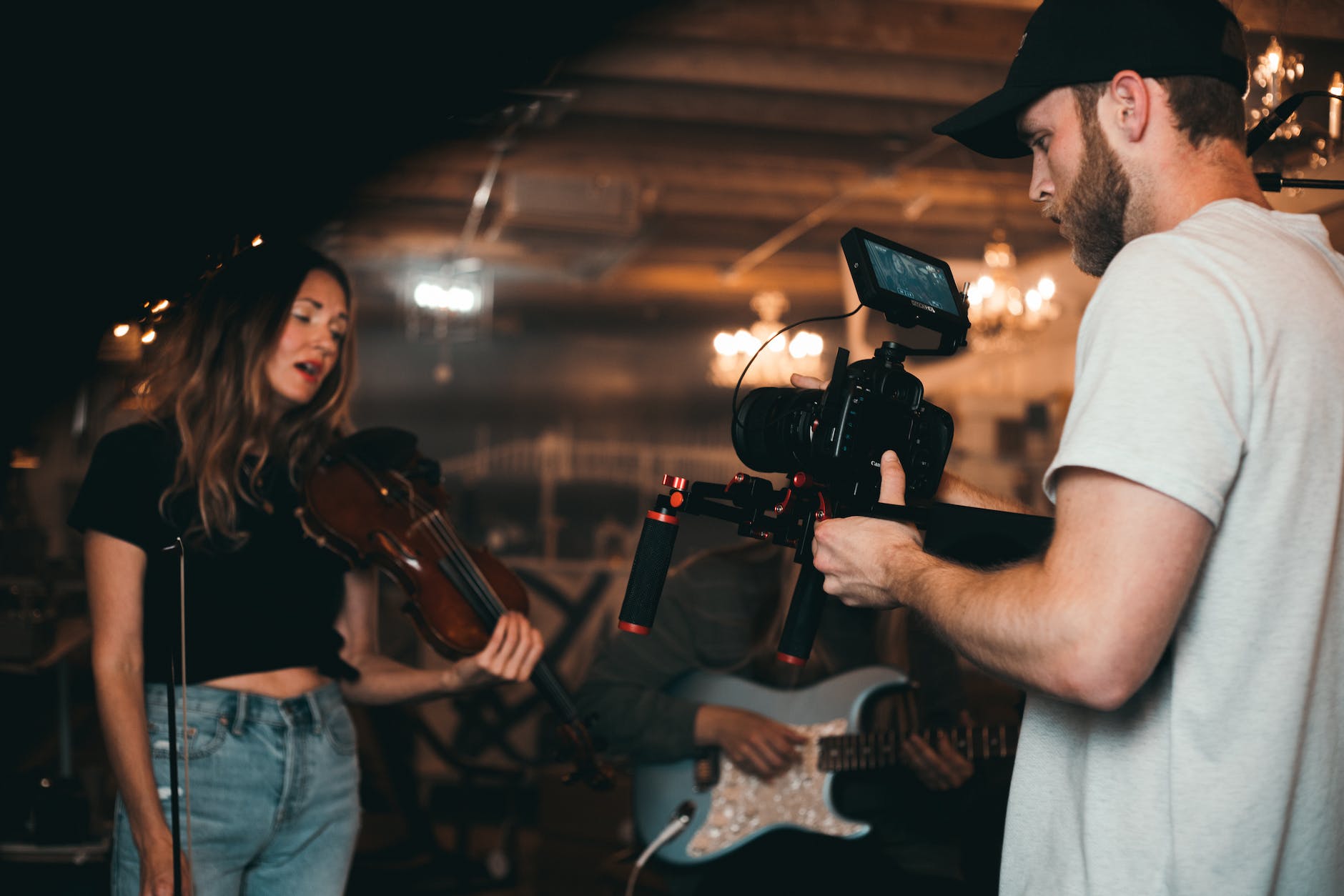As a musician, there may be times when you can’t play your instrument. Maybe it’s in the shop for repairs, or you’re recovering from an injury. But don’t worry! There are still plenty of ways you can continue to improve your musical skills. In this article, we’ll explore 9 effective ways to practice without your instrument. So let’s dive in!

1. Research Your Repertoire
Understanding the background of a piece of music can significantly enhance your overall appreciation and interpretation. Delving deeper into the composer’s life and influences can provide invaluable insights into the intention and meaning behind the composition.
Start by researching the composer’s biography. Explore their upbringing, education, and musical training. Understanding their early experiences and the development of their musical style can shed light on their unique perspective and creative approach.
Next, delve into the historical context in which the composition was created. Consider the political, social, and cultural climate of the time. It is fascinating to examine how external factors influenced the composer’s artistic choices. For instance, a piece composed during a time of war might reflect themes of turmoil or resilience.
Additionally, identify the specific influences that shaped the piece. These could include other composers, musical movements, or even personal experiences. By recognizing these influences, you can gain a deeper understanding of the composition’s stylistic elements, thematic development, and emotional nuances.
Listening to multiple interpretations and performances of the piece can also be enlightening. Pay attention to the differences in phrasing, dynamics, and overall musical interpretation. This can help you form your own artistic interpretation while respecting the composer’s original intent.
Remember, the goal is not solely to replicate the notes on the page, but rather to convey the essence and emotions embedded within the music. By immersing yourself in the composer’s world and contextualizing the composition, you can bring a more profound and personal connection to your performance. Happy exploring!

Pre-Record Your Performance
When you don’t have access to your instrument, there are still ways to continue practicing and improving your musical skills. One effective method is to pre-record a performance of your piece using your smartphone or a video camera.
To begin, find a quiet space where you can focus and set up your recording device. Position it in a way that captures your entire body and instrument. Take a moment to mentally prepare yourself, just as you would before a live performance.
When you’re ready, start playing your piece as if you were performing it in front of an audience. Pay attention to every detail, from your technique to the expression and phrasing of the music. Try to replicate the same level of intensity and passion you would have during a live performance.
Once you’ve finished recording, take some time to rest and then watch the video of your performance. As you watch, take note of areas that may need improvement. It could be anything from technical mistakes to dynamics, intonation, or overall musicality. Make notes on specific sections or moments that require your attention.
After analyzing the video, start addressing the areas you identified for improvement. Break down the piece into smaller sections and focus on each one individually. Practice slowly and deliberately, paying close attention to the specific challenges you need to overcome. Use your knowledge of technique and musicality to guide your practice sessions.
Remember to be patient with yourself and celebrate small victories along the way. Continuous practice, even without your instrument in hand, can help maintain and refine your musical skills. When you finally have your instrument back, you’ll be better equipped to apply what you’ve learned and continue progressing as a musician.
Keep in mind that this practice method is not meant to replace actual instrument practice, but rather to serve as a temporary solution during times when access to your instrument is limited.
3. Listen to Multiple Recordings
Exploring various interpretations and styles of music recordings can greatly enhance your own artistic journey. It allows you to delve into the depths of musical expression and discover new dimensions within your repertoire. As you immerse yourself in diverse recordings, take note of the unique nuances and techniques employed by different musicians. Observe how they approach phrasing, dynamics, and emotional interpretation. By carefully analyzing and reflecting on these variations, you can broaden your own musical understanding and gain fresh insights into the pieces you perform.
Furthermore, exposing yourself to a range of interpretations can expand your creative palette. It encourages you to think outside the box and experiment with different approaches to a musical work. Perhaps you’ll be inspired by a performer’s expressive freedom or a subtle artistic choice that you hadn’t considered before. Incorporating elements from various interpretations can help you craft a performance that is uniquely yours, infused with your own artistic voice while honoring the essence of the composition.
Moreover, listening to recordings of your repertoire can serve as a source of inspiration and motivation. Hearing the beauty and emotional depth that other musicians bring to the music can ignite your own passion and drive for artistic excellence. It can serve as a reminder of the transformative power of music and the incredible impact it can have on both performers and listeners alike.
In summary, immersing yourself in different recordings of your repertoire opens up a world of artistic possibilities. By absorbing and analyzing the interpretations of others, you can deepen your understanding, expand your creative horizons, and ultimately create performances that are rich, engaging, and uniquely yours.
4. Use Visual Aids
When it comes to musical performance, visual aids can be valuable tools to enhance your understanding and interpretation of the music. One effective technique is to create a personal copy of your sheet music and utilize it as a canvas for note-taking. By doing so, you can add various visual cues and markings that will assist you during practice sessions and performances.
For example, you can use the margins of the sheet music to jot down reminders or specific instructions related to dynamics, tempo changes, or articulation. This way, you’ll have a quick reference point to refresh your memory and ensure that you convey the desired musical expression.
Furthermore, employing different colors and symbols can be beneficial in highlighting important sections or musical ideas. For instance, you may choose to use a bold red marker to emphasize a particularly challenging passage that requires extra attention. On the other hand, using a calming blue color for a serene section can help evoke the intended mood while playing.
By creating a visual roadmap through these personalized markings, you will have a clear guide when you return to your instrument. This will not only assist you in memorizing the music more efficiently but also improve your overall performance. It can serve as a valuable aid in expressing your musical ideas with greater precision and emotion.
Remember, the purpose of these visual aids is to support your understanding and interpretation of the music, so feel free to experiment with different techniques and find what works best for you.
5. Stay in Shape
In addition to full-body warm-up exercises and breath control, there are other ways musicians can stay in shape even without their instruments. One effective method is focusing on mental practice. Visualize yourself playing your instrument and mentally go through the motions. This can help maintain muscle memory and keep your mind sharp.
Furthermore, listening to music attentively is another valuable practice. Analyze different genres, styles, and performances to expand your musical knowledge and understanding. This will not only feed your passion for music but also inspire you to explore new ideas and techniques when you have the opportunity to play again.
Additionally, studying music theory and composition can enhance your musical abilities. Use this time to delve deeper into understanding the mechanics behind the music you love to play. Sharpening your theoretical knowledge will ultimately benefit your overall musicianship and improve your compositions.
Lastly, take advantage of online resources to learn about the history and cultural context of different musical pieces and styles. By broadening your musical horizons, you can gain new perspectives and ideas that will enrich your performances in the future.
Remember, staying in shape as a musician involves a variety of activities, both physical and mental. Embrace these opportunities for growth, and when the time comes to pick up your instrument again, you’ll find yourself with new insights and renewed musical energy.
6. Sing Your Part
When you connect your voice to your instrument, a whole new world of musical expression and emotion opens up. Singing your part while playing allows you to intimately experience the music as you create it. As you match the notes and intervals accurately with your voice, you develop a heightened sense of pitch and tonality.
By singing along with your playing, you cultivate a deep connection between your instrument and your vocal cords. This connection yields a beautiful, natural playing quality that resonates with both the musician and the listener. As your voice and instrument harmonize, you create a captivating blend of melodies that can captivate and move your audience.
In addition to enhancing your playing technique, singing your part can also greatly improve your ear for music. By training your ear to accurately reproduce the melodies through your voice, you become more attuned to subtle variations in pitch, dynamics, and phrasing. This keen sense of musicality allows you to bring a higher level of artistry to your performances and interpretations.
So, next time you practice or perform, don’t hesitate to unlock the full potential of your musical expression by integrating your voice with your instrument. Singing your part will not only elevate your playing but also enrich your musical journey as you explore new depths of creativity and emotion.
7. Engage in Mental Practice
Mental practice is a powerful technique that can enhance your musical abilities and boost your overall performance. When you vividly imagine yourself playing your instrument, you create neural connections in your brain that are similar to those formed when you physically play. This type of visualization helps your brain to reinforce the correct muscle memory and coordination required for playing your instrument.
Imagine yourself sitting in a quiet space, with your instrument in hand. Close your eyes and visualize the instrument in great detail – its shape, color, and texture. Feel the weight of the instrument in your hands and how your fingers effortlessly navigate the keys, strings, or frets.
Now, bring your attention to the sound. Imagine the tone and timbre produced by each note you play. Hear the sound resonating in the air, filling the room, and enveloping you in a warm musical embrace. Focus on the clarity and precision of each note, ensuring that your mental practice reflects your desired level of musicality.
As you continue your mental practice, visualize yourself performing challenging musical passages flawlessly. Picture your fingers swiftly moving across the instrument, producing beautiful melodies or complex harmonies. Engage all your senses to immerse yourself fully in the experience – see, hear, and feel the music as if you were on stage or in a recording studio.
The more detailed and vivid your mental practice sessions become, the more effective they will be in helping you improve your musical skills. Use this technique regularly, especially when you are unable to physically practice, such as during travel or moments when your instrument is unavailable.
Remember, mental practice complements physical practice. It is not a substitute for actual playing but rather a valuable tool to optimize your learning and performance. Combine both forms of practice to maximize your potential as a musician and watch your skills soar to new heights.
8. Reflect on Your Goals
When setting musical goals, it’s important to be specific. Instead of just aiming to improve your overall technique, you could set a goal to work on a particular aspect of your technique, such as finger dexterity or rhythm accuracy. This allows you to break down your larger objective into smaller, more manageable tasks.
It’s also helpful to set a time frame for your goals. For example, you might aim to improve your finger dexterity by practicing a specific exercise for 15 minutes each day for the next month. Setting a deadline creates a sense of urgency and helps you stay accountable to your practice routine.
In addition to technical goals, consider setting musicality goals as well. Maybe you want to work on your phrasing, dynamics, or expression. Choose specific pieces or musical passages where you can focus on these elements and strive for improvement.
Remember to track your progress as you work on your goals. Keep a practice journal or use a digital tracking tool to note your accomplishments and challenges. Celebrate your achievements along the way and don’t get discouraged if progress is slower than expected. Patience and consistency are key in any musical journey.
Lastly, don’t forget to reassess and adjust your goals as you progress. As you achieve your initial objectives, new opportunities and challenges may arise. Stay open to growth and adapt your goals accordingly.
With a clear plan and dedication to consistent practice, you’ll be well on your way to achieving your musical aspirations. Enjoy the journey and embrace the process of improvement.
9. Collaborate with Other Musicians
Networking with other musicians can be a truly enriching experience for any musician aspiring to grow in their career. By actively seeking opportunities to socialize and collaborate with fellow musicians, you open yourself up to a world of possibilities.
First and foremost, networking allows you to build connections with like-minded individuals who share your passion for music. These connections can lead to valuable friendships and partnerships, both personally and professionally. Not only can you learn from each other’s experiences and insights, but you can also provide support and encouragement along the journey.
Collaborating with other musicians can also provide a unique space for inspiration and creativity. When you work with others, you have the opportunity to explore different musical styles, genres, and techniques. This cross-pollination of ideas can push you out of your comfort zone and challenge you to grow as an artist.
Furthermore, networking can open doors to new performance opportunities and gigs. As you build relationships within the music community, fellow musicians may recommend you for various projects, performances, or even introduce you to industry professionals who can further propel your career.
Additionally, attending music events, workshops, and conferences can provide excellent networking opportunities. These events bring together musicians from different backgrounds and expertise, creating a vibrant environment to exchange knowledge, share experiences, and establish meaningful connections. Remember, in the music industry, word-of-mouth and personal recommendations can play a significant role in your success.
Lastly, networking is not just limited to in-person interactions. The digital age has provided us with numerous online platforms where musicians can connect and collaborate with each other. Social media groups, forums, and music communities offer spaces to share your work, seek feedback, and potentially find new collaborators or mentors.
Ultimately, networking with other musicians is a vital element in any musician’s journey. It not only helps you expand your musical horizons but also provides the support, inspiration, and opportunities necessary for your growth and career development. So, embrace the power of networking and take proactive steps to connect with fellow musicians – you never know where these connections might lead you.
Conclusion
In conclusion, practicing without your instrument doesn’t have to hinder your musical progress. In fact, it can offer unique opportunities for growth and exploration. By researching your repertoire, pre-recording your performances, listening to multiple recordings, using visual aids, staying in shape mentally and physically, singing your part, engaging in mental practice, reflecting on your goals, and collaborating with other musicians, you can continue to improve your skills even when you can’t play your instrument.
Researching your repertoire and delving into the background and influences of a composition can deepen your understanding and interpretation. Pre-recording your performances and analyzing them afterward can help identify areas for improvement. Listening to multiple recordings expands your musical knowledge and allows for creative inspiration. Using visual aids and personalizing your sheet music can enhance your understanding and expression. Staying in shape mentally and physically through mental practice and other activities keeps you sharp and ready for when you can play again. Singing your part connects your voice with your instrument, improving technique and musicality. Engaging in mental practice reinforces muscle memory and coordination. Reflecting on your goals and setting specific objectives helps focus your practice. Collaborating with other musicians provides networking opportunities and creative growth.
By incorporating these practices into your routine, you can continue to develop as a musician and maintain progress even when you can’t physically play your instrument. Remember to be patient, consistent, and adaptable on your musical journey. Embrace the opportunities for learning and growth that practicing without your instrument presents.
So, keep exploring, keep practicing, and keep striving for musical excellence. With dedication and determination, you’ll be well on your way to becoming the best musician you can be.

